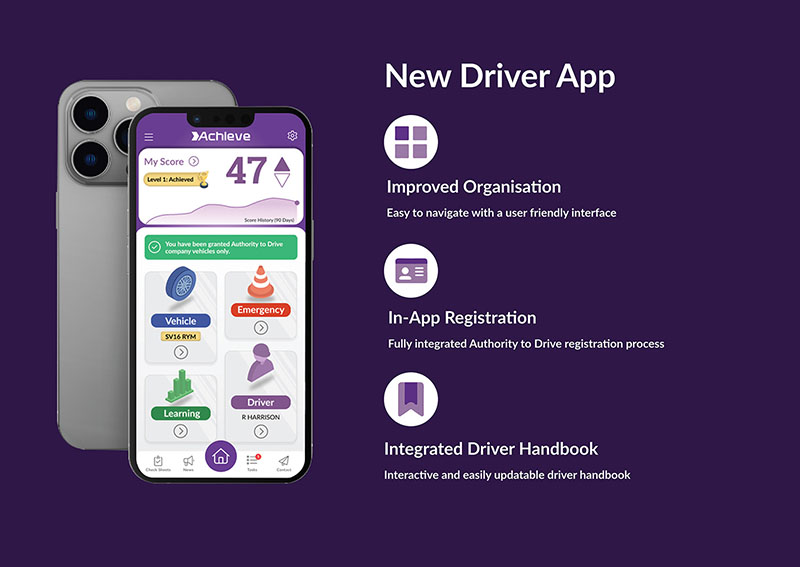This post was updated in December 2024
In today’s diverse working environments, managing drivers’ wellbeing extends beyond those driving company-owned fleets. It’s essential to remember that anyone driving on company time, even in their own vehicle, falls under the company’s responsibility. Whether you manage a traditional fleet or employees using personal vehicles for business (Grey Fleet), their mental health is a critical component to their wellbeing and to operational success.
During mental Health Awareness Month and beyond, here’s how companies can support all drivers more effectively:
Why Mental Health Is Key for Fleet Drivers
Fleet drivers face unique challenges: long hours, isolation, and high-pressure environments. These can lead to stress, anxiety, and fatigue, increasing the risk of accidents. Poor wellbeing has been linked to lapses in concentration, risk-taking, and road rage, all of which endanger lives.
Research also shows:
- Mental health issues cost UK businesses £35 billion annually, with 12 billion working days lost worldwide to depression and anxiety.
Practical Steps for Employers
Promoting mental health in the workplace isn’t just about workshops. Here are actionable ways employers can support their fleet drivers:
1. Foster Open Communication Channels
Creating an open and supportive communication environment is vital. Ensure that all drivers, regardless of whether they are in company vehicles or their own, feel they can freely discuss their concerns and challenges. Regular check-ins and an anonymous feedback system can help you identify and address any issues early, maintaining high morale and mental wellbeing.
2. Provide Mental Health Support and Resources
Equip all your drivers with access to mental health resources. This could include professional counselling services, subscriptions to wellness apps, and an Employee Assistance Program (EAP) that offers confidential support. Organising wellbeing workshops and driver training can empower drivers to manage stress effectively, which is beneficial for their overall health.
3. Implement Reasonable Work Schedules
Compliance with regulated hours of service should apply to all drivers to prevent fatigue and burnout. Review and adjust schedules to ensure that all drivers, whether they’re in personal or company vehicles, have adequate downtime and work hours conducive to a healthy work-life balance.
4. Encourage Physical Health as a Component of Mental Wellbeing
Support drivers in maintaining physical and mental health by providing information on exercises appropriate for small spaces and long durations seated. Offer access to healthy meal options and encourage regular physical activity, understanding that physical health significantly impacts wellbeing.
5. Cultivate a Strong Sense of Community
Combat the isolation that can come with driving jobs by fostering a strong community. This should include drivers in personal vehicles, integrating them fully into social groups, company meetings and events. Implementing a mentorship program can help all drivers feel connected and supported, regardless of the type of vehicle they operate.
6. Utilise Technology to Enhance Work-Life Balance
Make good use of technology to improve the work-life balance for your drivers. Route optimisation tools can reduce driving stress and time, while communication tools help all drivers keep in touch with family and the office, aiding in reducing feelings of isolation and increasing job satisfaction. Easy access to maintenance and accident management resources and support are paramount.
7. Recognise and Reward Efforts
A robust recognition and rewards program is important for all drivers. Regular acknowledgment through awards, public recognition, or bonuses can enhance morale and motivation, showing drivers that their hard work is appreciated irrespective of the vehicle they drive.
How the Wellbeing Workshop Supports Mental Health
Fleet Service GB’s Wellbeing Workshop tackles mental health head-on, focusing on the “Four Pillars of Wellbeing”:
- Fatigue Management- Covers sleep hygiene and techniques for better rest, essential for reducing stress and improving focus.
- Stress Awareness- Offers simple strategies to manage stress responses, helping drivers maintain calm and make safer decisions.
- Hydration and Nutrition- Explains the links between diet, hydration, and clarity, equipping drivers with tools to improve overall health.
The interactive, two-hour workshop fosters engagement through discussions, videos, and personalised action plans. By including education as a core component, Fleet Service GB demonstrates a commitment to driver safety and wellbeing.
Conclusion
Recognising that every individual driving on company time speaks volumes about your company and its values. It’s imperative to extend health and wellness support to all. By implementing these strategies across your fleet—be it traditional or composed of personal vehicles (Grey Fleet), you enhance not only the safety and satisfaction of your drivers but also the overall productivity and reputation of your operations. This comprehensive approach fosters a culture of care and commitment that benefits everyone involved.
FAQs About Fleet Driver Wellbeing
Why is mental health important for fleet safety?
Mental health affects concentration, judgement, and stress levels. Poor mental health can lead to unsafe driving behaviours, increasing accident risks.
What does Fleet Service GB offer for driver wellbeing?
The FSGB Driver Management Programme includes a Wellbeing Workshop that addresses key mental health challenges like stress, fatigue, and poor nutrition.
How can businesses benefit from supporting driver mental health?
Improving mental health reduces absenteeism, enhances safety, and boosts productivity, directly benefiting company performance.
How does the industry address mental health challenges?
Leading organisations collaborate with charities like Mates in Mind and implement driver support programmes to tackle these challenges
Additional Resources:
Mental Health Foundation https://www.mentalhealth.org.uk/our-work/public-engagement/mental-health-awareness-week
Mind https://www.mind.org.uk/get-involved/mental-health-awareness-week/
CALM https://www.thecalmzone.net/mental-health-awareness-week-2022
https://fleetservicegb.co.uk/continuous-learning/




